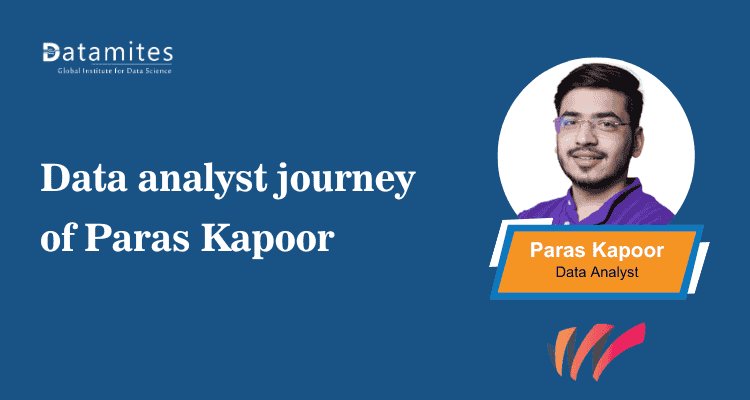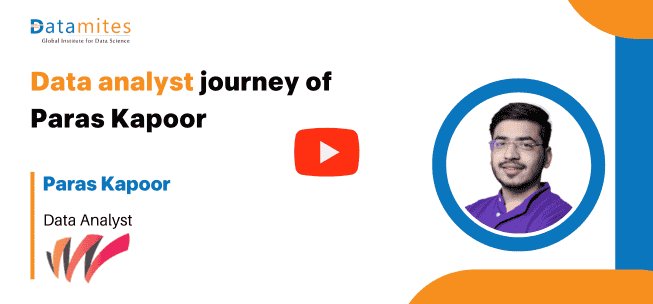Data analyst journey of Paras Kapoor
Explore the inspiring data analyst journey of Paras Kapoor. Learn how he built strong analytical skills, gained real-world experience, and achieved career success through dedication, practical learning, and a passion for data-driven insights.

Embarking on a data science career can be challenging, especially for non-technical professionals. Paras Kapoor’s journey from computational biology postgraduate to successful data scientist highlights how dedication, structured learning, and practical experience can lead to success. This article shares his insights, strategies, and advice for aspiring data analysts.
Paras Kapoor’s data analyst career from non technical background
Paras Kapoor’s journey from Computational Biology to a Data Scientist at M Technologies showcases determination, adaptability, and a passion for learning. His story proves that anyone can succeed in analytics with the right guidance. This interview shares his experiences and challenges, highlighting the value of IT courses in demand for aspiring professionals.
Q1. Paras, could you tell us about your background before entering data science?
I completed my post-graduation in Computational Biology, focusing on bioinformatics and genomic data. While working on biological data, I realized that coding and data interpretation excited me more than theoretical biology. I wanted to understand the logic behind data analyst tools rather than just use them, which led me to explore data science.
Q2. What inspired you to pursue a career in data science?
During my post-graduation, I often dealt with large datasets related to genome sequencing and RNA. The computational tools I used had machine learning algorithms at their core. This connection between biology and data inspired me to dive deeper into data analytics and learn the science behind those tools.
Q3. How did you begin your learning journey in data science?
I enrolled in DataMites, which provided structured learning and proper guidance. I had basic knowledge of Python, but the DataMites program helped me master the flow and real-world applications of the language through hands-on projects and assignments.
Q4. What role are you currently working in, and what are your responsibilities?
I’m currently working as a Data Scientist at M Technologies, focusing on computer vision and AI-based data analyst projects. My role involves training machine learning models, handling visual datasets, and building algorithms for real-time image detection systems a shift from my biology background but an exciting new challenge.
Q5. How many hours did you dedicate to learning during your training?
The daily sessions were about 2–3 hours, sometimes longer. I made it a rule to spend additional time implementing what I learned through projects and Kaggle challenges. Consistent practice and project-based learning made a big difference.
Refer to the articles below:
- From Fresher to Data Analyst: Dinesh’s Career Path
- Tushar’s Journey as a Data Analyst
- Shubham's journey from fresher to data analyst
Q6. Which topics did you find the most challenging?
Exploratory Data Analysis (EDA) was one of the toughest parts because it requires deep understanding and patience. Balancing and cleaning data took a lot of time, but it’s a critical skill for any data professional. Hyperparameter tuning in machine learning was also challenging yet rewarding.
Q7. Tell us about the projects you worked on during your course.
I worked on several projects involving static and live data, including patient prediction models and real-time data processing. During the four-month internship at DataMites, our team of four collaborated, divided tasks, and learned to solve real business problems efficiently.
Q8. How did DataMites help with placement preparation?
The placement team at DataMites played a crucial role in my success. They helped me with mock interviews, technical preparation, and soft-skill improvement. Initially, I struggled with communication in interviews, but their guidance helped me balance technical and interpersonal skills effectively.
Q9. How was your interview experience?
I attended three to four interviews before landing my current role. The initial interviews taught me how to present my answers confidently and structure my thoughts clearly. I realized that technical knowledge and communication skills are equally important for success.
Q10. What advice would you give to beginners starting in data science?
Don’t just rely on class lectures experiment and implement what you learn. Try solving problems in multiple ways, build small projects, and practice daily. Be curious, consistent, and confident. Even if you’re from a non-technical background, you can succeed with the right mindset and practice.
Q11. How would you describe your overall experience with DataMites?
It has been incredible! The mentors, especially the placement team, were extremely supportive. They were always available and helped me secure a job near my location in Noida. The program provided the foundation and direction I needed to grow.
Key findings from Paras Kapoor’s journey
Paras Kapoor’s journey from Computational Biology to a thriving career in data science offers valuable lessons for aspiring professionals. His experiences highlight how determination, structured learning, and practical exposure can overcome challenges in career transitions. The following key findings encapsulate insights from this DataMites success story, providing guidance for those aiming to excel in analytics.
- Background doesn’t limit success: Paras successfully shifted from a biology background to AI by following a structured learning path. His journey shows that prior education doesn’t restrict career growth. With dedication and guidance, anyone can pivot into tech.
- Practice matters: He highlighted the importance of project-based learning combined with daily coding practice. Hands-on work builds both understanding and confidence. Consistent effort is crucial for mastering technical concepts.
- EDA and ML tuning are challenging yet vital skills: Exploratory Data Analysis and Machine Learning model tuning require patience and attention to detail. Mastery of these areas distinguishes proficient analysts. They form the backbone of meaningful data insights and predictive models.
- Soft skills are equally important in interviews alongside technical knowledge: Communication, problem-solving, and teamwork play a key role during placements. Employers value candidates who can articulate solutions clearly. Balancing technical expertise with interpersonal skills boosts employability.
- Placements are achievable with DataMites’ continuous support and mock interviews: Regular guidance, mock interviews, and mentorship from DataMites enhance readiness for real-world opportunities. Structured placement support builds confidence and industry familiarity. Consistent preparation increases the chances of landing a role.
- Team projects build confidence and real-world experience: Collaborating on group projects simulates professional environments and strengthens problem-solving skills. Exposure to diverse ideas enhances learning outcomes. Real-world project experience makes candidates industry-ready and confident.
Paras Kapoor’s journey from biology to data science proves that determination and the right guidance make career shifts achievable. Enrolling in the DataMites Data Analyst course equips learners with hands-on projects, mentorship, and industry exposure, paving the way for a successful data analytics career.
Refer to the articles below:
- How to Become a Data Analyst in Mumbai?
- The Future of Data Analytics in Mumbai: Trends and Opportunities
- How much will be the Data Analytics Course Fees in Mumbai?
DataMites Institute is a leading provider of advanced IT training, offering programs in Data Science, AI, Machine Learning, Python, Data Analyst courses in Mumbai, Data Engineering, and IoT. Through hands-on projects, internships, and dedicated placement support, students acquire the practical skills required to excel in the industry. Globally recognized certifications from IABAC and NASSCOM FutureSkills further enhance professional credibility.
In addition to its Data Analyst courses in Hyderabad, DataMites provides flexible, industry-focused programs in major cities including Bangalore, Pune, Mumbai, Ahmedabad, Chandigarh, Delhi, Jaipur, and Coimbatore, ensuring learners across India have access to high-quality IT education aligned with current industry needs.

